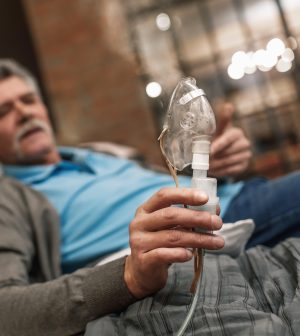- Could Your Grocery Store Meat Be Causing Recurring UTIs?
- Are You Making This Expensive Thermostat Error This Winter?
- Recognizing the Signs of Hypothyroidism
- 10 Strategies to Overcome Insomnia
- Could Artificial Sweeteners Be Aging the Brain Faster?
- Techniques for Soothing Your Nervous System
- Does the Water in Your House Smell Funny? Here’s Why
- Can a Daily Dose of Apple Cider Vinegar Actually Aid Weight Loss?
- 6 Health Beverages That Can Actually Spike Your Blood Sugar
- Treatment Options for Social Anxiety Disorder
Many Cancer Patients With Heart Issues Also Have Sleep Apnea

Sleep apnea appears to be linked to an increased risk of heart failure among cancer patients, a new study says.
Obstructive sleep apnea occurs when relaxed muscles cause a blockage of the windpipe, interrupting breathing and causing a person to temporarily wake.
The new study involved 296 general heart patients and 218 cancer patients with heart problems, researchers said.
Sleep apnea was actually more common among heart patients in general than in those undergoing cancer treatment, 54% versus 39%, results show.
However, sleep apnea among cancer patients with heart problems was equal to or greater than other traditional factors now used to assess their heart health risk, researchers found.
For example, left ventricular ejection fraction (LVEF) – a measure of how well the heart is pumping blood through the body – is used to predict heart problems related to cancer therapy.
But cancer patients who had a normal LVEF showed more evidence of heart strain if they also had untreated sleep apnea, the study found.
Cancer treatments like chemotherapy, radiation therapy and immunotherapy are known to be toxic to the heart.
“Sleep apnea should be incorporated into current risk algorithms and a larger study is needed to evaluate the impact of sleep apnea in this high-risk population. We feel that sleep apnea assessment must be a part of routine risk assessment for patients undergoing cancer therapeutics,” lead researcher Dr. Mini Das, medical director of the cardio-oncology program at Baptist Health in Louisville, Ky., said in a meeting news release.
These findings were to be presented at the American College of Cardiology’s course on Advancing the Cardiovascular Care of the Oncology Patient. The event was held in Washington, D.C., and online Friday through Monday. Findings presented at medical meetings should be considered preliminary until published in a peer-reviewed journal.
More information
Yale School of Medicine has more about the heart effects of cancer treatment.
SOURCE: American College of Cardiology, news release, Feb. 9, 2024
What This Means For You
Sleep apnea could help predict heart problems in patients undergoing cancer treatment.
Source: HealthDay
Copyright © 2026 HealthDay. All rights reserved.










